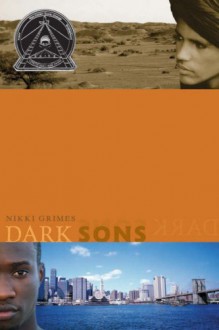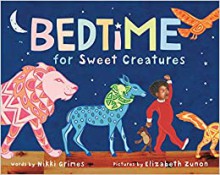
I’ll be honest and say I did not know what I was getting myself into when I picked up Dark Sons. I knew I had read things by Nikki Grimes before (and am embarrassed to say I could not remember what those things were) and that it looked like kind of an interesting. I was pleasantly surprised both by the format and content of the book.
One thing to know (and again something I should have but didn’t know before I read the book) is that it is a collection of poems that tell the story of two sons dealing with a changing relationship with their father. The first is Ishmael and his relationship with his father Abraham (from Old Testament fame) and the second is a more modern distancing about a teenager named Sam. Through the course of the book the similarities and differences of these two interpretations are brought to the forefront through alternating sections of poetic cycles.
As someone who grew up in a fairly religious household (and as a result when I stopped being particularly interested in faith for religious reasons and more for academic ones), I really enjoyed the Ishmael side of the book. He has always been a fascinating character to me and the role he plays is one that I feel like is ripe for a lot of different interpretations. I felt like this interpretation of what his emotions and feelings must have been were incredibly well done and were interesting when compared to the Christian response in terms of how Sam was able to deal with his father’s new family in the modern part of the book. It set up an interesting parallel of having God take care of these people while still not making a great life for them or seeming to always have their best interest at heart.
I thought the portrayal of Sam was also incredibly well done. It felt incredibly real and is one of the few reasons I would potentially recommend this book to a student. The way that the character processes emotions and was able to separate his feelings for his father and his new wife from those for his step-brother was quite interesting and something I feel like most people have had to do even if not with this particular situation.
I do not think I would ever assign this book primarily because I think that religion is a bit too explicitly central. That said, I have several students that I am already thinking of who could relate and benefit immensely from this. I also think that there are students like me who might see the comparison of Ishmael as almost a “patron saint” of someone abandoned by their father to be compelling even without the religious overtones it produces. Overall, it was a good, quick read and the format was something different that I found quite refreshing (although, this should not be super surprising coming from me since my favorite format for books are short story cycles).


 Log in with Facebook
Log in with Facebook 









